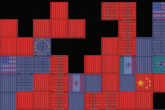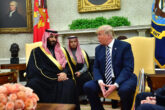March 08, 2019
Congress Should Make Financial Transparency a U.S. National Security Priority
Last month, a bipartisan group of senators reintroduced a bill designed to expand the range of coercive measures the United States can impose on Russia for its broad range of malign activity, from election interference to ongoing intervention in Ukraine. The updated version of the Defending American Security from Kremlin Aggression Act, or DASKA, contains an array of new measures, including ones targeting the Russian energy and banking sectors. Among the most notable are congressional efforts to expand financial transparency, which would put the U.S. in a much better position not only to counter dirty Russian money flowing through the U.S. financial system, but the illicit financing efforts of a variety of other American adversaries.
DASKA, which was first introduced last summer but was not voted on, reintroduces a measure that had been included in the August 2017 omnibus sanctions law but has generated a great deal of domestic political controversy ever since. By law, the Trump administration was compelled to release a list of Russian oligarchs who were believed to be close to President Vladimir Putin or to be using their economic resources to support his foreign policy. The unclassified list the Treasury Department released in January 2018, however, disappointed many observers, as it closely resembled the Forbes magazine list of richest Russians, and made no effort to publicly address whether any of the individuals named worked closely with Putin or not.
Read the full article in World Politics Review.
More from CNAS
-
Game Over?
The trade wargame suggests that sustained high tariffs could create leverage and urgency to spur action toward a productive restructuring of the international trade system....
By Emily Kilcrease & Geoffrey Gertz
-
Middle East Security / Energy, Economics & Security
Trump Inks $600 Bn Deal In Saudi Arabia | Musk, Blackrock CEO Flank Trump In Gulf VisitIn today's episode of India Global, U.S. President Donald Trump secured a $600 billion commitment from Saudi Arabia on Tuesday to invest in the United States. NDTV's Gaurie Dw...
By Daniel Silverberg
-
Energy, Economics & Security / Technology & National Security
Tariffs and Tech: An Uncertain RecipeHigher tariffs could prompt American cloud companies to shift more of their capital investments abroad....
By Pablo Chavez
-
Trump Tariffs: How Will U.S. Plans Reshape the Global Economy?
Donald Trump says he's already decided the tariffs he will impose on countries that export goods to America, including the United Kingdom. Channel 4 hears from Emily Kilcrease...
By Emily Kilcrease




